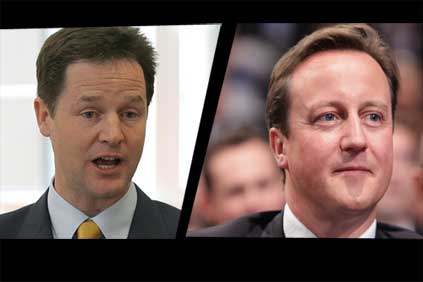The Conservatives - the UK's main opposition party - won the most votes and seats but fell short of an outright majority. Their leader David Cameron announced they would begin talks with the third-placed Liberal Democrats on forming a coalition government.
Ordinarily the pro-European Lib Dems would make uneasy bedfellows with the eurosceptic Conservatives. However, difficult times can make difficult choices easier to make.
Speaking about the prospect of talks and common ground between the two parties, Cameron highlighted renewables as a possible area of collaboration. He said: "They [the Liberal Democrats] want a low carbon economy and together we can achieve that."
During the recent televised debates between the three main candidates, all three remained broadly in favour of renewable energy. Yet there is still likely to be different ideas with how to move forward on this.
In terms of electricity supply, the Liberal Democrats have been largely behind renewable energy as the best way forward, with leader Nick Clegg citing wind as the main option.
Broadly speaking the Conservatives are mainly in favour of offshore when it comes to wind. During the debates, Prime Minister Gordon Brown accused Cameron of being anti-onshore. This is something that has frequently been backed up around the country by Conservative MPs campaigns against the development of wind farms in their constituencies.
A bigger area of contention between Clegg and Cameron is the latter's plan to build nuclear power stations as well as offshore wind farms. Clegg's belief is these will take two long to build to support the UK's immediate energy needs and will cost too much.
It is worth noting the UK has recently become a hotbed of wind technology development as well as being the first to pass the 1GW offshore milestone.
Speaking in the aftermath of the election, Gaynor Hartnell, CEO of the UK trade body the Renewable Energy Association said the government needed to move swiftly to ensure cross-party consensus regarding renewable energy. She said: "If any changes are to be made to existing policies, they must be done in a way which maintains investor confidence and momentum."
"We need to see primary legislation for a new Green Investment Bank. New regulations must be in place by April next year to implement the Renewable Heat Incentive so that renewables can start to play their part in heating the nation. We also need the new government to quickly implement sustainability standards and to drive forward higher greenhouse savings in biofuels. Some adjustment is needed to the feed-in tariffs for some small-scale renewables technologies."



.png)

HR.jpeg)
.png)








